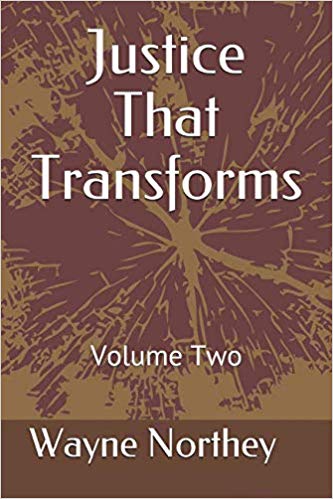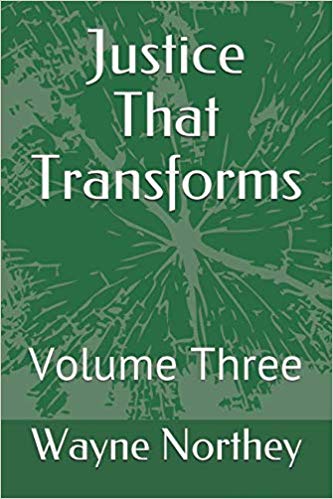First 3 Volumes Fall 2018; Volume One Republished January 2020; Volume Four September 2024
SEARCH and ARCHIVES options are at the bottom of all website pages.
WN: I’m pleased to add this page about three books produced fall 2018. They are of my writings on Restorative Justice over the years, including (in Volume One) by a few contributors. They are part of a projected multivolume series. I then hope to publish another series of my Peace/Peacemaking writings, tentatively titled Justice the Harvest of Peace.
Dr. Liz Elliott
The title of the series is from one of the persons to whom I also dedicate it: Dr. Ruth Morris. She was an early outstanding mentor to me. You may read this dedication to her memory by Dr. Liz Elliott, here. She also was a great personal mentor.
In my paper about Ruth’s thunderously repeated slogan, Not Enough!–and International Restorative Justice, vis à vis conventional notions of Restorative Justice as promoted by Howard Zehr and others, I write:
“Not Enough!” and the Way Forward
However, Restorative Justice has stopped at the borders of state criminal justice, and has so far not pushed to the “final frontier” of international state relations and international law.1 Ruth Morris, 2000 recipient of the Ron Wiebe Restorative Justice Award, coined a notable response to Restorative Justice as it emerged in North America during the 1990’s: “Not Enough!”2
Her subsequent research in particular took her to comparisons between white collar and street crime. She died before the era of massive criminal revelations about Enron, the movie The Corporation, the international War on Terror, and much more that would substantiate her ground-breaking concerns In it, she mentions the trip we made just months before Ruth Morris’ being awarded the Order of Canada–Canada’s highest honour.
Liz also cites another very good friend, whom I gratefully have coffee with regularly: Gerry Ayotte.
***
Below are three Tables of Content, three Forewords, and one Preface (that explains about the books — slightly revised each time).
PLEASE NOTE: Every chapter title is clickable, taking you to the paper on this website.
I’ll add reviews, etc., (hopefully) in due time. If you order any of the books, a review on Amazon and sent to me for possible posting would be great! Thanks.
All the chapters below are not only on the website, but also. with a few more, on academia.edu here.
Finally: Wipf and Stock Publishers gratefully re-published (my re-edited) Volume One January 9, 2020. However, due to financial commitments (their business model for all but well-established authors requires a financial investment), I have decided to publish no further Volumes by them. But they keep thereby all their books in print indefinitely! No complaints therefore. There was also enormous time investment to prepare a manuscript to their exacting standards! But they offer the option to readers to search this website for the remaining books in the series. Crowdfunding anyone?… 🙂
I have also unpublished on Amazon and Kindle their versions of the first volume. I made sufficient revisions to mainly introductions (“Context” in reissued Volume 1), that I’d rather have you order the latest.
The graphic artist created a beautiful cover, as you can see!
NOTE: An audio file of the 2018 version may be accessed thus:
- Click on link;
- then click on down arrow of “Open With”;
- then click on “Music Player for Google Drive”. (You may also need to sign up for a Google account.) As you can see, there is the option also to download the file.
Each book audio file is about 600 MB — far too large to place onto website directly.
Footnotes:Foreword
There has been, sadly so, a predictable tendency within the historic Western tradition to read, interpret and apply the Bible within the crime and punishment, justice ethos in a retributive manner—an eye for an eye, tooth for tooth, Shylockian pound of flesh dominating the day, fair Portia banished from the stage. A rather narrow and reductionistic read of the Hebrew canon (Old Testament) has dominated and, in an imperial sort of way, colonized alternate notions of both justice and mercy that can equally be found in the Old Testament, Apocrypha and New Testament. The Jewish prophets and the Sermon on the Mount are two needful portals and correctives to a one-dimensional and reactionary read of the Bible.
There has also been a predictable tendency within the much longer historic Western and Christian tradition to develop, in greater depth and detail, via legal systems and jurisprudence, more finely tuned notions of Retributive Justice. We might ask why this single-vision approach to justice has so come to dominate and what other options might be mined within both the Bible and the Christian Tradition that question and doubt the reigning monarch of Retributive Justice? The answer to such a nagging question can be aptly and amply answered, from a variety of angles, in this superb book by Wayne Northey.
Each of the in-depth and detailed chapters in this must-read beauty of a tome highlight, in not-to-be missed insights, how and why the ideology of Retributive Justice has dominated, the consequence of such a reality, and why Restorative Justice has not really been tried and found wanting.
Wayne, to his credit, has spent many a decade in the restorative trenches (he was there at the beginning many a decade ago) and he tells a worthy tale about the need to, Phoenix-like, resurrect the Restorative Justice tradition. There has been a tendency to pit the liberal rehabilitative approach against the more conservative retributive approach, but the 3rd way of Restorative Justice has many a possibility worth the fuller probing. The genius of the book is the way Wayne both probes ever deeper and thinks ever wider and fuller about these timely and timeless issues. Again, I might add that Wayne’s thinking and writing emerge from decades of being in the thick of the fray and the diverse articles embody such a reality.
The fact that the Restorative Justice position has often been marginalized, misunderstood or caricatured as a sort of naïve idealism is found wanting in Wayne’s animated and vigorous defense of Restorative Justice. I might add that beyond the importance of Restorative Justice is the broader notion of Transformative Justice that Wayne has often pondered. I have been fortunate, over the decades, to have had Wayne lecture in my classes in Philosophy of Law and other classes on Restorative/Transformative Justice. Students have raised tough questions about both positions and Wayne has answered each question admirably, well, charitably and wisely. This book does much the same but in a more in-depth way and manner.
The fact that Wayne engages Biblical exegetes’ questionable read of the Bible when applied to justice, the way the Western Tradition has erred in significant ways in this area, and how significant approaches by the Evangelical and Reformed Christian tribes have only seen with one eye on this issue are held up for serious scrutiny by Wayne in this packed and challenging bounty of a book. Wayne has lived in the midst of these issues at the Biblical, Christian Tradition and contemporary Evangelical and Reformed levels. He knows the nuances and subtleties but he is also acutely aware of how, time and again, Retributive Justice dominates the day (and the practical implications of it). There is a unique sense in which Wayne (although probably not seeing himself as such) comes as prophetic voice to the establishment and status quo Sanhedrin and dares to question their misread of the Bible and Christian Tradition. Again a careful read of this well-crafted book will, if read discerningly, reveal much that is often, tragically, ignored in how Christians interpret the Dostoevskian crime and punishment dilemma.
I have gently urged Wayne, over the years, to compile and thread together many of the articles he has written on Restorative Justice (and they are legion). I have no doubt that those who read and inwardly digest the articles chosen by Wayne for this unique collection and book will be generously rewarded by each read and reread. Certainly the way Wayne immerses the curious reader in the trying issues will refocus the way justice is often defined and understood. I do, therefore, heartily recommend this exceptional book to the reader with an open mind: their understanding of justice may never be the same again.
I might add, by way of conclusion, that George Grant’s English Speaking Justice will walk the interested yet further down the philosophic trail that Wayne (and peers) are well on.
Amor Vincit Omnia
Department of Political Science, Philosophy and Religious Studies, University of the Fraser Valley
NOTE: The chapters linked below have revisions in the new Volume 1 mainly to a new “Context” heading.
Table of Contents
Table of Contents
Restorative Justice Then, Now and A Dream
Spirituality of Penal Abolition
Punishment and Retribution: An Attempt to Delimit Their Scope in New Testament Thought
Spirituality Evaluation of Restorative Justice, Sixth International Conference on Restorative Justice, “Best Practices in Restorative Justice”, Vancouver, June 4, 2003
Restorative Reintegration, Sixth International Conference on Restorative Justice, “Best Practices in Restorative Justice”, Vancouver, June 1, 2003
Restorative Justice and Prison Visitation
Restorative Justice Spirituality
“Not Enough!” and International Restorative Justice: COV&R Presentation, May 31 – June 4, 2006, Ottawa, Ontario, Canada
Is There A Place For Dreaming?: Restorative Justice and International State Conflict
Restorative Justice Stories – MCCC 50th Anniversary, December 14, 2013
The Sex Offender as Scapegoat: Vigilante Violence and a Faith Community Response
Transformative Justice Vision and Spirituality
About the Author
Justice That Transforms:Volume Two (paperback), or Justice That Transforms: Volume Two (Kindle) Cdn; or Justice That Transforms: Volume Two (paperback), or Justice That Transforms: Volume Two (Kindle) U.S.
NOTE: An audio file may be accessed thus:
- Click on link;
- then click on down arrow of “Open With”;
- then click on “Music Player for Google Drive”. (You may also need to sign up for a Google account.)
As you can see, there is the option also to download the file. Each book audio file is about 600 MB — far too large to place onto website directly.
Foreword
I admire Wayne’s long-time passion for Restorative Justice. He was among the early pioneers who encouraged us to keep ‘digging’ deeper. Without ceasing, in and out of season, he kept reflecting on justice issues theologically and biblically and keeps publishing.
Thanks Wayne!
Pierre Allard, President, Just.Equipping/Juste.Équipage
Table of Contents
Foreword
Preface
Table of Contents
A Halting Spiritual Quest, Three Affirmations, and Restorative Justice, M2/W2 CORE Training: Spirituality
Blindness and Sight, Darkness and Light
Book Review of No Future Without Forgiveness, Desmond Mpilo Tutu
Devotional – M2/W2 Staff-Board Retreat, June 12, 1999
Rediscovering Spiritual Roots: The Judeo-Christian Tradition and Criminal Justice
M2/W2 and Enemy Love As Core Gospel
The Two Great Commandments and Prison Ministry
The Cross: God’s Peace Work – Towards a Restorative Peacemaking Understanding of the Atonement
Mercy, Mr. Harper, Not Sacrifice (Jesus)
Book Review of Beyond Retribution: A New Testament Vision for Justice, Crime, and Punishment, Christopher D. Marshall
Book Review of Compassionate Justice: An Interdisciplinary Dialogue with Two Gospel Parables on Law, Crime, and Restorative Justice, Christopher D. Marshall
Book Review of Compulsory Compassion: A Critique of Restorative Justice, Annalise Acorn
Book Review of The Death Penalty: An Historical and Theological Survey, James J. Megivern
Book Review of The Fall of the Prison: Biblical Perspectives on Prison Abolition, Lee Griffith
“Then They Shouldn’t Eat Chicken!”
Book Review of: God’s Just Vengeance: Crime, Violence and the Rhetoric of Salvation, Timothy Gorringe
About the Author
Justice That Transforms: Volume Three (paperback and Kindle) Cdn; or Justice That Transforms: Volume Three (paperback and Kindle) U.S.
NOTE: An audio file may be accessed thus:
- Click on link;
- then click on down arrow of “Open With”;
- then click on “Music Player for Google Drive”. (You may also need to sign up for a Google account.)
As you can see, there is the option also to download the file. Each book audio file is about 600 MB — far too large to place onto website directly.
Foreword
It was Wayne’s enthusiasm that drew me into the restorative justice movement early in its formative years – many years ago. Because of my victim experience, I wasn’t always a natural fit, yet he had the ability to find a place for me. He was always thorough and meticulous in his research, presentation, and promotion of the programs wherever he went. He oozed Restorative justice and struggled to make it relevant in today’s society, in the criminal justice system, and in his own life. I’m thrilled that he is writing and publishing his findings and his life’s work. They are and always will be, invaluable.
Wishing you the best with this work.
Wilma Derksen, C.E.C., O.M.
Wilma Derksen (one of four women to whom I dedicate this and the last Volume also) in Canada early on embraced Restorative Justice, and she parlayed that into a creative force for those harmed by crime across Canada and wider afield. She also ever held Restorative Justice practitioners and theorists to account to never forget those harmed by crime. A rare honour for Wilma was her family’s story told in inimitable style by Malcolm Gladwell in David and Goliath: Underdogs, Misfits, and the Art of Battling Giants.
Table of Contents
Foreword
Preface
Rwanda Dispatches May 18 to July 12, 2018
War, Police and Prisons: Cross-Examining State-Sanctioned Violence, Streams of Justice, September 28, 2009
WAR AND HELL – and Exception-Clause Footnote Theology
Just War, Just Deserts, Just Hell
From Restorative Justice to Transformative Justice, Tri-Cities Justice Forum, November 29, 1999 Book
Book Review of Justice That Restores, Charles W. Colson, Wheaton: Tyndale House Publishers, Inc., 2001
Book Review of The Executed God: The Way of the Cross in Lockdown America, Mark Lewis Taylor, Fortress Press, 2001
Book Review of Solving Hell: A Mystery Story, by Chris Friesen, A Thesis Presented to the Faculty of Mennonite Brethren Biblical Seminary, for the Degree Master of Theology, 2003, unpublished
Book Review of The Nonviolent Atonement, J. Denny Weaver, Grand Rapids: Wm. B. Eerdmans Publishing Co., 2001/2011
Book Review of Violence, Hospitality, and the Cross: Reappropriating the Atonement Tradition, Hans Boersma, Grand Rapids: Baker Academic, 2004 About the Author
Restorative Justice — “Not Enough!” Volume Four
Justice That Transforms: Restorative Justice — “Not Enough!” Volume Four | September 2024
Clicking on the above or image will take you to all three versions: paperback, hardcover, Kindle.
- Please see my subsequently written/presented: “Is There A Place For Dreaming?: Restorative Justice and International State Conflict” after this chapter.[↩]
- See her article, ““Not Enough!”, Mediation Quarterly, Volume 12, Number 3., Guest Editor, Harry
Mika, Ph.D. San Francisco: Jossey-Bass Publishers, pp. 285 – 291” (1995); and her book Penal Abolition: The Practical Choice (1995), pp. 70ff.[↩] - See: Rwanda Dispatches May 18 to July 12, 2018 in Volume Three.) We were exposed to much about Rwanda’s post-genocide (1994) Restorative Justice/reconciliation journey. We were left with “impressions” when we departed, with no particular authority gained to assess realities there. While in Rwanda I wrote a series of “Dispatches” about our reconciliation learning. They may be found in Volume Three of this series.((They are also on my website.[↩]
- A technical note: Wipf and Stock Publishers request use of American spelling throughout.[↩]






